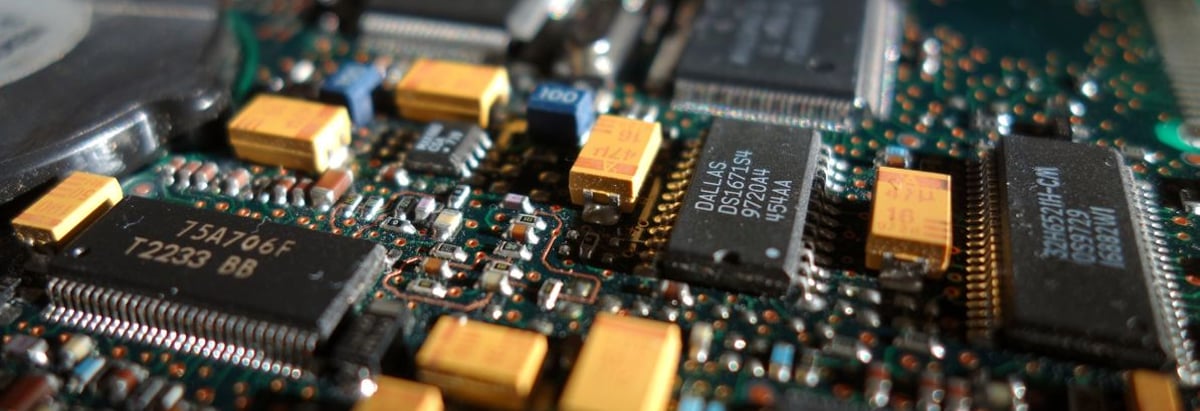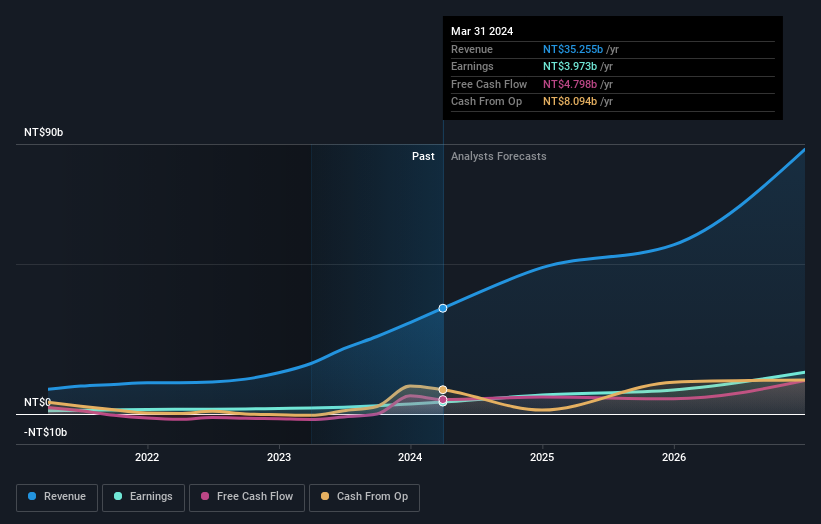- Taiwan
- /
- Semiconductors
- /
- TWSE:3661
Institutional investors have a lot riding on Alchip Technologies, Limited (TWSE:3661) with 46% ownership

Key Insights
- Given the large stake in the stock by institutions, Alchip Technologies' stock price might be vulnerable to their trading decisions
- A total of 25 investors have a majority stake in the company with 44% ownership
- Analyst forecasts along with ownership data serve to give a strong idea about prospects for a business
A look at the shareholders of Alchip Technologies, Limited (TWSE:3661) can tell us which group is most powerful. The group holding the most number of shares in the company, around 46% to be precise, is institutions. In other words, the group stands to gain the most (or lose the most) from their investment into the company.
And things are looking up for institutional investors after the company gained NT$17b in market cap last week. The one-year return on investment is currently 26% and last week's gain would have been more than welcomed.
Let's delve deeper into each type of owner of Alchip Technologies, beginning with the chart below.
Check out our latest analysis for Alchip Technologies

What Does The Institutional Ownership Tell Us About Alchip Technologies?
Many institutions measure their performance against an index that approximates the local market. So they usually pay more attention to companies that are included in major indices.
As you can see, institutional investors have a fair amount of stake in Alchip Technologies. This suggests some credibility amongst professional investors. But we can't rely on that fact alone since institutions make bad investments sometimes, just like everyone does. If multiple institutions change their view on a stock at the same time, you could see the share price drop fast. It's therefore worth looking at Alchip Technologies' earnings history below. Of course, the future is what really matters.

We note that hedge funds don't have a meaningful investment in Alchip Technologies. GIC Private Limited is currently the largest shareholder, with 5.1% of shares outstanding. With 3.9% and 3.8% of the shares outstanding respectively, BlackRock, Inc. and The Vanguard Group, Inc. are the second and third largest shareholders. In addition, we found that Shyang-Lin Shen, the CEO has 2.2% of the shares allocated to their name.
Our studies suggest that the top 25 shareholders collectively control less than half of the company's shares, meaning that the company's shares are widely disseminated and there is no dominant shareholder.
While studying institutional ownership for a company can add value to your research, it is also a good practice to research analyst recommendations to get a deeper understand of a stock's expected performance. Quite a few analysts cover the stock, so you could look into forecast growth quite easily.
Insider Ownership Of Alchip Technologies
While the precise definition of an insider can be subjective, almost everyone considers board members to be insiders. The company management answer to the board and the latter should represent the interests of shareholders. Notably, sometimes top-level managers are on the board themselves.
I generally consider insider ownership to be a good thing. However, on some occasions it makes it more difficult for other shareholders to hold the board accountable for decisions.
We can see that insiders own shares in Alchip Technologies, Limited. This is a big company, so it is good to see this level of alignment. Insiders own NT$7.8b worth of shares (at current prices). If you would like to explore the question of insider alignment, you can click here to see if insiders have been buying or selling.
General Public Ownership
The general public-- including retail investors -- own 45% stake in the company, and hence can't easily be ignored. This size of ownership, while considerable, may not be enough to change company policy if the decision is not in sync with other large shareholders.
Next Steps:
It's always worth thinking about the different groups who own shares in a company. But to understand Alchip Technologies better, we need to consider many other factors. Consider risks, for instance. Every company has them, and we've spotted 2 warning signs for Alchip Technologies you should know about.
If you are like me, you may want to think about whether this company will grow or shrink. Luckily, you can check this free report showing analyst forecasts for its future.
NB: Figures in this article are calculated using data from the last twelve months, which refer to the 12-month period ending on the last date of the month the financial statement is dated. This may not be consistent with full year annual report figures.
New: Manage All Your Stock Portfolios in One Place
We've created the ultimate portfolio companion for stock investors, and it's free.
• Connect an unlimited number of Portfolios and see your total in one currency
• Be alerted to new Warning Signs or Risks via email or mobile
• Track the Fair Value of your stocks
Have feedback on this article? Concerned about the content? Get in touch with us directly. Alternatively, email editorial-team (at) simplywallst.com.
This article by Simply Wall St is general in nature. We provide commentary based on historical data and analyst forecasts only using an unbiased methodology and our articles are not intended to be financial advice. It does not constitute a recommendation to buy or sell any stock, and does not take account of your objectives, or your financial situation. We aim to bring you long-term focused analysis driven by fundamental data. Note that our analysis may not factor in the latest price-sensitive company announcements or qualitative material. Simply Wall St has no position in any stocks mentioned.
About TWSE:3661
Alchip Technologies
Engages in the research and development, design, and manufacture of fabless application specific integrated circuits (ASIC) and system on a chip (SOC)in Japan, Taiwan, and China.
Exceptional growth potential with flawless balance sheet.
Similar Companies
Market Insights
Community Narratives




